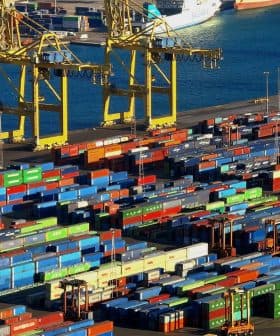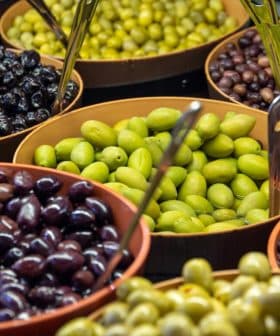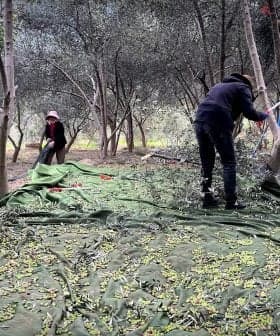Adulteration Risk as Olive Oil Gains Ground in China
A report from the Spanish Institute of Foreign Trade highlights the potential for olive oil sales in China, but warns that some opportunists are selling adulterated oil, risking the perception of olive oil as a high-quality product among Chinese consumers. Despite challenges, the report suggests that China is the fastest growing market for Spanish olive oil companies, with opportunities to capitalize on the growing middle class’s interest in the health benefits and prestige of olive oil.
A new report on a huge potential to sell olive oil to China also comes with a warning — opportunists there are already cashing in by selling adulterated oil.
According to “The Olive Oil Market in China 2012″ from the Spanish Institute of Foreign Trade (ICEX), “this malpractice risks tainting the Chinese consumer perception that olive oil is a high quality product.”
The 58-page report even suggests that a good deal of the growth spurt in olive oil imports in China is thanks to such importers.
Nevertheless, among the advice for Spanish olive oil companies is that China is their fastest growing market and the one offering the most potential. The challenge is to convert a growing middle class from occasional to daily olive oil users. They may not like its strong taste for now but they do like its health benefits and prestige, the report suggests.
Market snapshot
Overseen by the Spanish Embassy Office for Economic and Commercial Affairs in Shanghai, the report says that while olive oil accounts for only about 1 percent of oil and fat sales in China, it is the most dynamic segment. It grew 21 percent in sales last year to reach 697,51 million RMB (about €84m or $110m), ahead of sunflower oil, which grew 20.8 percent and has a 7 percent share.
In terms of volume, China is now the world’s seventh biggest olive oil importer, though it is still small compared to the United States and Italy. Last year it took 32,886 tons of olive oil — up 55 percent on 2010 — and 92 percent of it was virgin. Spain is the main supplier, followed by Italy, and the oil comes in equal parts bulk and bottled.
Use of vegetable oil has risen along with disposable incomes in the Asian giant. But seven other, cheaper vegetable oils are consumed more than olive oil. Chief among them are vegetable oil blends, rapeseed and soy oil.
The Chinese olive oil consumer
In blind tastings, Chinese consumers favor refined olive oil. They feel virgin olive oil has a strong flavor hard to adapt to their cuisine and thus prefer blander oils. However, they see virgin olive oil as a higher quality product and this is a key factor when buying, as are health concerns.
“The main reason Chinese consumers buy olive oil is that it is good for the health,” the report says. “This increasing interest in healthy eating is a huge opportunity for Spanish olive oil companies to exploit.”
The main opportunities: beyond the big smoke
Olive oil, like other foreign goods, has been entering China via its major cities, such as Shanghai, Beijing and Guangzhou. These remain the main market and must not be neglected. “However the real growth and potential lies in the second and third tier cities and in the countryside, in that order.”
“Unlike in the bigger cities, there is not yet such a high presence of olive oil in supermarkets and that combined with rising incomes make these zones enormously promising for Spanish companies.”
While big supermarkets account for 75 percent of olive oil sales, this channel has less growth potential than others, such as the gift market — very important, particularly for Chinese New Year staff gift baskets — and rapidly-increasing online sales.
“The battle to get into the Chinese supermarket has already been fought and is practically over, with the vast majority of the key international brands already on store shelves. Most large chains now have stable relationships with their own small range of importers.”
Trade in cosmetics based on olive oil is thriving. In some zones, olive oil is considered a beauty and even medicinal product. China’s popular business directory, Alibaba, has more than 1200 listings related to olive oil- based cosmetics.
Threats
“The main threats (for Spanish exporters) are the heavy investments by Chinese companies in building their own brands, and damage to olive oil’s image by opportunists with sales of adulterated or blended oils.”
Many Chinese companies from outside the food sector have been attracted by olive oil’s enormous potential. “They also import bulk oil but in some cases take advantage of loopholes in China’s olive oil and label regulations to sell the oil mixed with other vegetable oils, reducing their costs along with the quality ” the report says, describing a practice that the world’s second biggest importer, Italy, is also sometimes accused of.
“It’s possible that a good deal of the growth that has been seen in olive oil imports in China is due to such (Chinese) importers, given the difference between the figures for imports and those for sales.”
“This can lead to overstocking, and if the oil is stored in poor conditions, and there is insufficient rotation, it could suffer considerable loss of quality, thereby further undermining olive oil’s prestige in China.”
Labeling
Label laws changed recently but in general olive oil bottles must include details including production and expiry dates, harvest year, country of origin, instructions for use, and trans fatty acids content.
Great leap coming in Chinese olive plantations
Though for climactic reasons China is considered unlikely to ever reach self-sufficiency in olive oil, its current five-year plan provides for a five-fold expansion in plantations for both table olives and olive oil.
About 160,000 new hectares are planned in the vicinity of Tibet, on the Himalayan slopes, up from a current plantation area of no more than 40,000 hectares mainly in the provinces of Sichuan, Gansu and Hubei and largely used to produce dry olives eaten as snacks.
Spanish companies are advised this is a big opportunity to sell their technology and expertise and to get in before the Italians or others do.










